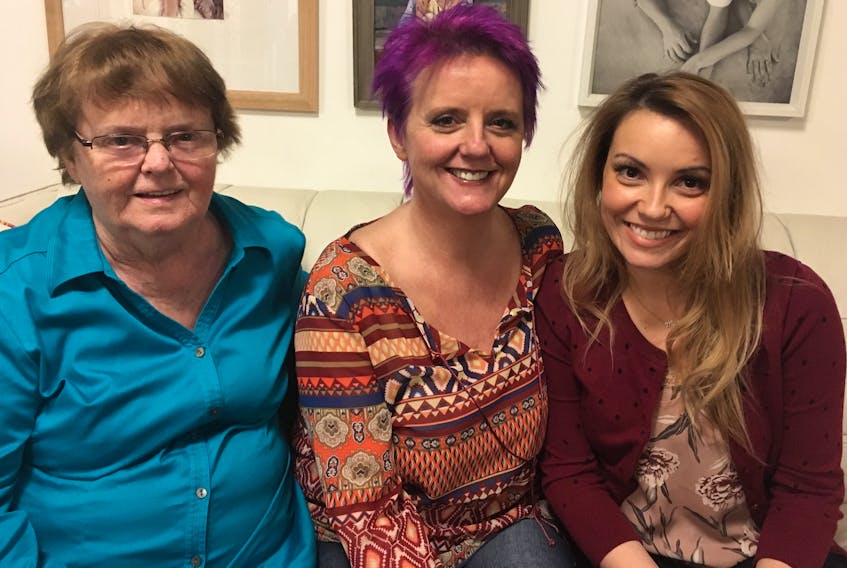At 18 years old, Geraldine Browne was married for 10 months and about to give birth to her first child. It was 1952 in Great Paradise, Placentia Bay.
“I didn’t know where the baby was going to come out through,” she says. “That’s true!”
Browne says sexual health education was non-existent in those days in the community of Rushoon, where she grew up.
“I was always pregnant — there was one coming after another as fast as they could come,” she says. “I had 12 children. Fourteen pregnancies.
“I lost two,” she says, her voice trembling. “I was Catholic and that’s what we were supposed to do then. I didn’t think anything of it any more than that was my job and that was it.”
With International Women’s Day at the forefront of their minds, Browne and her daughter, Violet Browne, 52, and Violet’s daughter, Meghan Careen, 32, talked to The Telegram about their very different experiences growing up as women in three different generations in Newfoundland.
Particularly poignant is how easily Careen and Violet are able to discuss their experiences compared to Geraldine, who frequently becomes emotional during the conversation.
“We’re allowed to talk about anything, and that is just therapeutic and empowering, and nanny doesn’t have that,” says Careen.
Geraldine says she was raised to be silent.
“We weren’t allowed to talk about anything,” she says.
“Your first period, you wouldn’t speak of it. We weren’t allowed to speak about it.”
One facet of the women’s daily lives in which they notice huge improvements over the course of their three generations is a woman’s ability to control her own body.
“I saw girls married at 14 and 15,” Geraldine says. “Pregnant, you know, and had to get married. That was the word then — ‘She had to get married.’”
“So, having the option to put your child up for adoption was progress, I guess, at one point. I never thought about that,” says Violet, who speaks about the many young women she knew as a teenager who either put their children up for adoption or the children were raised by other family members because young pregnant women were shamed.
One woman she knew had 21 children, six of whom were actually grandchildren.
“Yes,” agrees Geraldine. “I had two or three friends who got pregnant when they were young. I don’t know what they were called — everything from the stars down because they got pregnant before they were married. But the boys weren’t.”
Thinking back to her life as a teenager when she went to the small school in the community, Geraldine says her teacher treated the girls especially harshly.
“If we had a male teacher, he looked down on the girls.”
Geraldine recalls one specific example to highlight her point.
“I was in Grade 11, there was a male teacher. … One day — he really treated the girls badly — he was shaking my sister, just shaking her, and she was in Grade 9.
“I’m going to start now,” Geraldine says, acknowledging she’s starting to weep.
“So, I just jumped up to help her. He took me and pushed me out in the porch, with a ruler in his hand, took the ruler edgewise and put three marks on each hand. On the back of the hand. That’s what we were treated like when we were young, teen, young women.”
“There was quite a number of girls who were beaten (at school). I don’t remember anything with the males.”
Geraldine recalls one teacher in particular who would use any excuse to treat the girls in the classroom that way, whether they were talking to one another or copying another’s work.
“Just any little thing,” she says.
Idyllic childhood
Skip ahead two generations to Careen, and her description of her daily life as a child is drastically different.
“I had a really idyllic upbringing, really, from my perspective,” she says.
Careen describes days spent going to public school, where she was “well taken care of” and afternoons spent playing with her friends.
As for Violet, the generation in-between, she recalls rebelling against the institutions that she felt held her mother back.
“I think a lot of Mom’s decisions were based on what she had been taught, and based on fear. Because the Catholic Church had such authority, and such a hold on people, and Mom, God bless her, ended up with some rebellious kids that I can imagine was life-altering for her, and it had to be very hard for her.
“A lot of it was fear for us, I think. Mom was very, very strict, but my sister got pregnant when she was 17, and she wasn’t put out of the house like lots of people were. And the baby was welcomed, and loved.
“So, I think Mom’s heart always won out over the …,” Violet pauses for some time and her voice sounds strained as she continues, “over the terror that was instilled in her.
“I often said, poor ol’ Mom was dragged into the 21st century because of the hooligans that she reared,” Violet says. “There were a couple of us who were very strong-willed, and independent, and rebellious, and rebelling not only against Mom — just rebelling against all of the restrictions that you were supposed to live under. And just somehow, something natural telling you, ‘No. That’s not the way it has to be.’”
Violet says she quit school in the 10th grade and started her own salon business. After many years working as a stylist, and with three children, she decided she wanted a change. She went to university and decided to study English because it made her happy.
The simple fact that Violet could choose to completely change her life and career because she thought it would make her happy is something Geraldine would have never dreamed for herself.
“I can see a big difference in my daughter’s and my granddaughter’s life and mine,” Geraldine says. “I don’t think women expected anything big in their lives. That’s the way I thought. Women then were expected to, and they did, what they thought were things for women. Ways of life are so different today.”
The women speak about how privileged they are to even be able to sit around and have this conversation, and how even though it’s evident when Geraldine speaks about her younger years that the world has progressed leaps and bounds for today’s women, they acknowledge there is still far to go — especially for women in other parts of the world.
“This same discussion could happen everywhere, but it would be so very different,” Violet says. “Because even us, in our insistence on inclusion and equity and all of those things, we don’t know the life of the woman who would give anything to not have to have another baby, or the woman who would give anything to not have to have her clitoris cut off, or the woman who would give anything to be able to earn a dollar or five dollars. I mean, it’s a big, huge, huge job.”
Careen has two young children, and says she often thinks about their future and the kinds of changes she hopes they will get to experience during their lifetime.
“What I would like to see happen would be people who can appreciate differences in gender, in male, female or however you identify, but that those differences wouldn’t matter in the same way that they do now,” Careen says.
“I would hope that individuals could just be seen for their strengths, or for their uniqueness as people, rather than as men and women. I think I still see a lot of people in my generation who would say to their little girls, ‘You can do this, too,’ and emphasize the ‘too,’ and that really bothers me because I really want that to go without saying.”
Violet says the female reality today, as it was during her mother’s generation, is that the world, for many women, is not a safe place.
“It’s going to take generations … and the Me Too and the Time’s Up movements are exciting to me. Really, really exciting. But they’re only a germ. They’re only a germ of where we need to go, where we need to get.
“The biggest change or improvement that could happen, and the one that’s necessary, is for women to start believing what we’ve been trying to sell to the world, believing what we’re saying. To go back to the pay piece because that’s an easy comparison … most dominated fields, or a lot of it — engineering and all of those — you’re negotiating your salary. And women negotiate lower than men negotiate. And that’s because we don’t believe what we’re trying to tell ourselves. … That’s where the mind shift needs to happen first.”
As for Geraldine, her wish for her grandchildren and great-grandchildren is that they have a far different experience than what she had.
“I hope that women forevermore are never … here I go again,” she says, again acknowledging the tears forming in her eyes, “women are never looked down on as a doormat … because if you were a woman, you were really looked down on. I wouldn’t want to see that happening to any of my grandchildren.”
Careen says she hopes her children will live in a world where there is no need for International Women’s Day.
“I hope that every day will be international human day. That’s what I’d like to see for women’s rights, because as we always say, women’s rights are human rights.”









